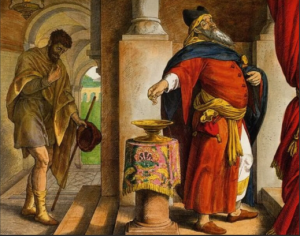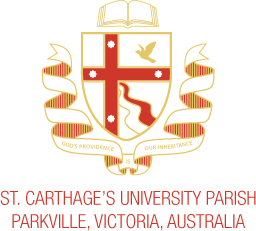Entrance Antiphon
Let the hearts that seek the Lord rejoice;
turn to the Lord and his strength;
constantly seek his face.
First Reading: Sirach 35:12-14, 16-18. A reading from the book of Ecclesiasticus
The prayer of the humble will penetrate the heavens.
The Lord is a judge
who is no respecter of personages.
He shows no respect of personages to the detriment of a poor man,
he listens to the plea of the injured party.
He does not ignore the orphan’s supplication,
nor the widow’s as she pours out her story.
The man who with his whole heart serves God will be accepted,
his petitions will carry to the clouds.
The humble man’s prayer pierces the clouds,
until it arrives he is inconsolable
nor will he desist until the Most High takes notice of him,
acquits the virtuous and delivers judgement.
And the Lord will not be slow,
nor will he be dilatory on their behalf.
Responsorial Psalm: The Lord hears the cry of the poor.
- I will bless the Lord at all times,
his praise always on my lips;
in the Lord my soul shall make its boast.
The humble shall hear and be glad. (R.)
- The Lord turns his face against the wicked
to destroy their remembrance from the earth.
The just call and the Lord hears
and rescues them in all their distress. (R.)
- The Lord is close to the broken-hearted;
those whose spirit is crushed he will save.
The Lord ransoms the souls of his servants.
Those who hide in him shall not be condemned. (R.)
Second Reading: 2 Timothy 4:6-8, 16-18. A reading from the second letter of St Paul to Timothy
All that remains is the crown of righteousness reserved for me.
My life is already being poured away as a libation, and the time has come for me to be gone. I have fought the good fight to the end; I have run the race to the finish; I have kept the faith; all there is to come now is the crown of righteousness reserved for me, which the Lord, the righteous judge, will give to me on that Day; and not only to me but to all those who have longed for his Appearing.
The first time I had to present my defence, there was not a single witness to support me. Every one of them deserted me – may they not be held accountable for it. But the Lord stood by me and gave me power, so that through me the whole message might be proclaimed for all the pagans to hear; and so I was rescued from the lion’s mouth. The Lord will rescue me from all evil attempts on me, and bring me safely to his heavenly kingdom. To him be glory for ever and ever. Amen.
Gospel Acclamation: Alleluia, alleluia! God was in Christ, to reconcile the world to himself; and the Good News of reconciliation he has entrusted to us. Alleluia!
Gospel: Luke 18:9-14. A reading from the holy Gospel according to Luke
 The publican returned to his home justified; the pharisee did not.
The publican returned to his home justified; the pharisee did not.
Jesus spoke the following parable to some people who prided themselves on being virtuous and despised everyone else, ‘Two men went up to the Temple to pray, one a Pharisee, the other a tax collector. The Pharisee stood there and said this prayer to himself, “I thank you, God, that I am not grasping, unjust, adulterous like the rest of mankind, and particularly that I am not like this tax collector here. I fast twice a week; I pay tithes on all I get.” The tax collector stood some distance away, not daring even to raise his eyes to heaven; but he beat his breast and said, “God, be merciful to me, a sinner.” This man, I tell you, went home again at rights with God; the other did not. For everyone who exalts himself will be humbled, but the man who humbles himself will be exalted.’
REFLECTION
It is very easy for religious people to fall into a kind of self-righteousness. Their very enthusiasm and generosity can plant the seeds of religious arrogance. They know what commitment demands of them; they experience relative success in their endeavors to be faithful; they distance themselves from what they think might threaten their resolve; and then they pass judgment on those who do not share their values or experience their success. This kind of arrogance is often imperceptible, because there is enough truth in every step along the way that it is difficult to recognise when one is veering off the track.
Jesus extols the humility of the one who admits being a sinner, and can accept the implications of that admission. This is the kind of prayer that is described in the reading from Sirach and the psalm response. It is those who can admit that they are needy who turn to God in that need. It is those who trust that God will be their strength in the face of their weaknesses who are strengthened.
Paul’s own prayer demonstrates the attitudes that should be ours as we pray. Like the Pharisee, he acknowledges his success. He has competed well; he has finished the course; he has kept the faith. However, unlike the Pharisee, he acknowledges that God is the source of any good he has been able to accomplish. The Lord stood by him and gave him strength. If there is any glory, it belongs to God. Paul’s confident prayer springs from a humble heart.
